
Mark N. Trahant is Executive News Editor of The Salt Lake Tribune. Trahant completed "Pictures of Our Nobler Selves" as a Visiting Professional Scholar at The Freedom Forum First Amendment Center at Vanderbilt University.
The following is an extract from the article dealing specifically with the contributions of three Cherokee journalists; Elias Boudinot, John Rollin Ridge, and Elias Cornelius Boudinot. The complete text is located on The First Amendment Center's website at http://www.fac.org/publicat/trahant/contents.htm
Uncovering forgotten journalism history is the first purpose of this report. The second is to validate the notion that it is essential for American Indians and Alaskan Natives to work in the media, both tribal and mainstream.
Mark N. Trahant
Vehicles of Intelligence
... Native Americans have made significant contributions to journalism for nearly two centuries. This history starts in the 1820s in the Cherokee Nation's capital of "New Town" or New Echota, Georgia. The leaders of the Cherokee Nation believed their destiny was linked to making "their nation an intelligent and virtuous people."So the nation went about the task they called civilization: cultivating land, ideas and laws.
But it was the invention of the Cherokee alphabet that was the powerful agent of change. In a couple of months-a tick of a second on a nation's clock-thousands of Cherokee people learned to read and write in their own language.
"Most historians credit Sequoyah, the most famous Cherokee, with the invention of the syllabary. However, some oral historians contend that the written Cherokee language is much, much older. But even if there was an ancient written Cherokee language, it was lost to the Cherokees until Sequoyah developed the syllabary," wrote Cherokee Principal Chief Wilma Mankiller in 1993. "The development of the syllabary was one of the events which was destined to have a profound influence on our tribe's future history. This extraordinary achievement marks the only known instance of an individual creating a totally new system of writing."
If there was to be civilization, a Republic, then it would come on Cherokee terms. Written Cherokee had "swept away that barrier which [had] long existed and opened a spacious channel for the instruction of adult Cherokees."
At first, written Cherokee was primarily for Christian instruction. But tribal leaders also saw the vision of a national newspaper. In 1827, Principal Chief John Ross and the national council selected a young man who had taken the name Elias Boudinot as the first editor of The Cherokee Phoenix.
"To obtain a correct and complete knowledge of these people, there must exist a vehicle of Indian intelligence, altogether different from those which have heretofore been employed," Boudinot said in a speech raising money for the project.
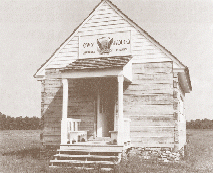 "The columns of The Cherokee Phoenix will be filled, partly with English, and partly with Cherokee print; and all matter which is of common interest will be given in both languages in parallel columns.
"The columns of The Cherokee Phoenix will be filled, partly with English, and partly with Cherokee print; and all matter which is of common interest will be given in both languages in parallel columns.
"As the great object of The Phoenix will be the benefit of the Cherokees, the following subjects will occupy its columns.
"1. The laws and public documents of the Nation.
"2. Account of the manners and customs of the Cherokees, and their progress in Education, Religion and the arts of civilized life; with such notices of other Indian tribes as our limited means of information will allow.
"3. The principal interesting news of the day.
"4. Miscellaneous articles, calculated to promote Literature, Civilization, and Religion among the Cherokees."
The Phoenix was supposed to start publishing with the new year of 1828, but the paper supply did not arrive in time. On February 21, 1828, the first edition of The Phoenix appeared.
"As The Phoenix is a national newspaper, we shall feel ourselves bound to devote it to national purposes. 'The laws and public documents of the Nation,' and matters relating to the welfare and condition of the Cherokees as a people, will be faithfully published in Cherokee and English," Boudinot wrote in the first issue. "As the liberty of the press is so essential to the improvement of the mind, we shall consider our paper, a free paper, with, however, proper and usual restrictions. ... But the columns of this newspaper shall always be open to free and temperate discussions on matters of politics, religion, and so forth."
The usual and proper restrictions, however, were left to different interpretations by the state of Georgia and the Cherokee government.
Georgians had been trying to oust their Cherokee neighbors for decades. Secretary of War John C. Calhoun, Secretary of State John Quincy Adams and President James Monroe met with a Cherokee delegation in 1824 to extinguish aboriginal title in Georgia, and this meeting was seen by Georgians as a federal promise for removal.
But the Cherokee delegation, led by Boudinot's uncle, Major Ridge, was equally firm in its right to stay. Even if the United States paid all of the money in its treasury or exchanged twice as much land, the Cherokee Nation said, such compensation would fall short of equity. Moreover, the Cherokee Nation said it could not recognize "the sovereignty of a state within the limits of [its] territory."
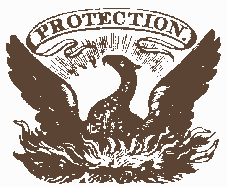 The state enacted a number of laws in the 1820s and 1830s designed to destroy Cherokee sovereignty-and the will of tribal members to resist "removal" from their homeland. The greed of the Cherokee's Georgia neighbors intensified after gold was found in 1828, and tribal members were forbidden by law from mining, even on their own land. A removal champion, Wilson Lumpkin, was elected governor
on the Union Party Ticket in 1831. Union Party newspapers predicted the new governor would settle this problem once and for all, aided by the old Indian fighter and now president, Andrew Jackson. The state annexed Cherokee lands, banned the tribal legislature from meeting and seized property from tribal members.
The state enacted a number of laws in the 1820s and 1830s designed to destroy Cherokee sovereignty-and the will of tribal members to resist "removal" from their homeland. The greed of the Cherokee's Georgia neighbors intensified after gold was found in 1828, and tribal members were forbidden by law from mining, even on their own land. A removal champion, Wilson Lumpkin, was elected governor
on the Union Party Ticket in 1831. Union Party newspapers predicted the new governor would settle this problem once and for all, aided by the old Indian fighter and now president, Andrew Jackson. The state annexed Cherokee lands, banned the tribal legislature from meeting and seized property from tribal members.
"Yes, this is the bitter cup prepared for us by a republican and religious government," Boudinot wrote. "We shall drink it to the dregs."
What really infuriated Georgia was that the Cherokee Nation was indeed civilized. Boudinot wrote in the June 17, 1829, edition that perhaps Washington, Jefferson, Madison and Monroe "were only tantalizing us when they encouraged us in the pursuit of agriculture and government. ... Why were we not told long ago that we could not be permitted to establish a government within the limits of any state?
"The Cherokees have always had a government of their own. Nothing, however, was said when we were governed by savage laws."
Liberty was as dear to Boudinot and to the Cherokee as it was to the founders of the United States of America. And it was inconceivable that these freedoms would be denied to any Americans. The Midgeville Statesman and Patriot said it was time for the Cherokees to submit to inevitable destiny.
"What destiny?" Boudinot replied. "To be slandered and then butchered?"
A new Georgia law required all non-Cherokees to take an oath of allegiance to the state or leave Cherokee Territory. Many Georgians believed that the Cherokee could do nothing on their own-and if the outside agitators were removed, the Cherokee would leave too. Some even believed that Boudinot was only a front for a white man who was the true editor of The Phoenix. Boudinot dismissed this idea a number of times: "It has already been stated to the public that The Phoenix was under Cherokee influence. It has never been, nor was it ever intended to be, under the influence of any Missionary or White man."
Nonetheless, Georgian authorities started a campaign to arrest non-Cherokees who refused to take the oath.
"This week we present to our readers but half a sheet," Boudinot wrote in The Phoenix on Feb. 19, 1831. "One of our printers has left us; and we expect another (who is a white man) to quit us very soon, either to be dragged to the Georgia penitentiary for a term not less than four years."
Nor could the editor ask for more help-any other white printer would be arrested too.
"And our friends will please remember," the editor wrote, "we cannot invite another white printer to our assistance without subjecting him to the same punishment; and to have in our employ one who has taken the oath to support the laws of Georgia, which now suppress the Cherokees, is utterly out of the question. Thus is liberty of the press guaranteed by the Constitution of Georgia."
On March 26, 1831, The Phoenix reported the arrest of several non-Indian missionaries by the Georgia Guard, the state militia. One was Samuel Worcester, who in addition to helping Boudinot at the paper was also the Cherokee Nation's postmaster. However, the state judge released Worcester and the missionaries, saying they were in the Cherokee Nation as "agents of the government."
Even though the state court sided-at least in part-with the Cherokee cause, Boudinot was amazed. "We were very much surprised to hear that the missionaries were discharged on the ground of their being agents of the government. Who ever thought of such a thing before? It shows that a Judge may twist into law what shape he pleases."
The Georgia Guard's Col. C.H. Nelson also harassed Boudinot. The editor was brought before the Guard for a possible libel action against The Phoenix. Once Boudinot was in custody, Nelson told him that he could not be prosecuted under Georgia law, but if the reportage of the Guard's activities did not cease, Nelson would tie him to a tree and give him a sound whipping.
Boudinot responded with a series of editorials on the Guard and freedom. Boudinot wrote: "In this free country, where the liberty of the press is solemnly guaranteed, is this the way to obtain satisfaction for an alleged injury committed in a newspaper? I claim nothing but what I have a right to claim as a man-I complain of nothing of which a privileged white editor would not complain."(10)
Meanwhile, Boudinot's friend Samuel Worcester continued to wait in a Georgia prison. On March 3, 1832, the U.S. Supreme Court ruled in favor of the Cherokee cause in the landmark decision, Worcester v. Georgia. Chief Justice John Marshall wrote: "The Cherokee Nation, then, is a distinct community, occupying its own territory, with boundaries accurately described in which the laws of Georgia can have no force and which the citizens of Georgia have no right to enter, but with the assent of the Cherokees themselves. ... the acts of Georgia are repugnant to the constitution, laws and treaties of the United States."
The Court reversed the Georgia courts and said state law did not apply in Cherokee territory.
"It is a glorious news," Boudinot wrote his brother Stand Watie, who was acting editor of The Phoenix while Boudinot traveled across the country to raise money for the newspaper. "The laws of the State are declared by the highest judicial tribunal in the Country null and void. It is a great triumph on the part of the Cherokees so far as the question of their rights were concerned."
Boudinot predicted "a new era on the Indian question." Perhaps in theory. But the court ruling only intensified the emotions of the Georgians. Both the state and the federal government increased pressure on the Cherokees to move West, and six months later, Boudinot was convinced that removal was inevitable. He was bitterly disappointed by the government's failure to enforce its own Supreme Court decision, and he came to believe that the Cherokee had no options left.
This epiphany placed Boudinot in direct conflict with the leadership of the Cherokee government. It was clear that the very discussion of removal was illegal (and considered treasonous).
The Cherokee Constitution did not guarantee a free press. And tribal politicians argued that the editor, and the newspaper, were instruments of public policy. Chief Ross even called The Phoenix a "public press" and said it "should be cherished as an important vehicle in the diffusion of general information, and as a no less powerful auxiliary in asserting and supporting our political rights ....
"The press being the public property of the nation, it would ill become its character if such infringements upon the feelings of the people should be tolerated. In other respects, the liberty of the press should be as free as the breeze that glides upon the surface."
The contradiction in Ross' statement is telling: The Phoenix was as free as the breeze-until its writings infringed on the feelings of the people or those of the leadership.
On Aug. 11, 1832, Boudinot resigned as editor.
"Were I to continue as editor, I should feel myself in a most peculiar and delicate situation. I do not know whether I could, at the same time, satisfy my own views, and the views of the authorities of the nation. My situation would then be as embarrassing as it would be peculiar and delicate. I do conscientiously believe it to be the duty of every citizen to reflect upon the dangers with which we are surrounded; to view the darkness which seems to lie before our people-our prospects, and the evils with which we are threatened; to talk over all these matters, and, if possible, come to some definite and satisfactory conclusion."
Boudinot believed in discourse, conversation in the printed columns that debated the merits of a policy, even a policy as controversial as removal.
A few days after Boudinot's resignation, Chief Ross wrote to the National Council that The Phoenix ought to be continued under the leadership of a new editor.
"The views of the public authorities should continue and ever be in accordance with the will of the people; and the views of the editor of the national paper be the same. The toleration of diversified views to the columns of such a paper would not fail to create fermentation and confusion among our citizens, and in the end prove injurious to the welfare of the nation."
Ross hired Elijah Hicks as the new editor of The Phoenix. And few questioned the new editor's loyalty: he was Ross' brother-in-law.
Boudinot continued to write letters and joined the political opposition consisting of his relatives-the Ridge, Boudinot and Watie families-as well as other Cherokee families who favored negotiating a new treaty.
"Removal, then, is the only remedy-the only practicable remedy," Boudinot wrote in a letter to Chief Ross. "What is the prospect in reference to your plan of relief, if you are understood at all to have any plan? It is dark and gloomy beyond description. Subject the Cherokees to the laws of the States in their present condition?"
The Cherokee Nation was divided. Boudinot's allies became known as the Treaty Party, while supporters of the chief became the Ross Party. But political parties were moot at this point anyway: Georgia made it illegal for the Cherokees to meet or hold elections. The newspaper was destroyed by the Georgia Guard in October of 1835, and its lead type dumped into a well.
Boudinot and other Treaty Party members signed a removal treaty in December and agreed to leave Georgia for land in what is now Oklahoma. "I know that I take my life into my hand, as our fathers have also done. ... Oh what is a man worth who will not die for his people? Who is there here that will not perish, if this great Nation may be saved?"
Boudinot knew exactly what was at stake: It was treason, and tribal law clearly called for the death penalty for agreeing to removal. However, none of the 20 Cherokees who signed the New Echota Treaty was ever charged with any tribal offense. In the winter of 1838, some 14,000 Cherokees were marched from Georgia to the new lands on the Trail of Tears. The Boudinots moved to Park Hill, Cherokee Nation, where the bitter dispute continued.
On June 28, 1839, some Cherokee men rode up to Boudinot's house on horses. They asked for medicine. Boudinot went to get it.
"He walked but a few rods when his shriek was heard by his hired men, who ran to his help; but before they could come back the deed was done. A stab in the back with a knife, and seven gashes in the head with a hatchet, did the bloody work," wrote his friend and neighbor Samuel Worcester. "In his own view he risked his life to save his people from ruin, and he realized his fears."
The story of The Phoenix illustrates the central quandary of tribal journalism today. Does a tribal newspaper serve its community by printing discourse? Or, does it aid the enemies of tribal government by revealing a community's weakness? This debate is no more resolved now than when Boudinot died. It is also one of the reasons for the success of independent newspapers, such as Tim Giago's Indian Country Today and Paul DeMain's News From Indian Country.
Golden Words
Elias Boudinot was not the only assassination victim on that day in June. His uncle, Major Ridge, died in an ambush near the Arkansas border. And, at dawn, raiders pulled his cousin John Ridge from his bed and stabbed him nearly 30 times.
Twelve-year-old John Rollin Ridge witnessed his father's murder. Fearing for her family, Sarah Ridge moved her children from the Cherokee Nation to Fayetteville, Arkansas. But the border town was not free of the tribe's political split, and the Ridge-Watie-Boudinot family-now called the Treaty Party-continued to confront and battle Ross supporters. Often these debates became violent (a problem common to 19th-century politics).
Sometimes the politics became personal. David Kells, a Ross supporter, mutilated and gelded a prize stallion owned by John Rollin Ridge. When confronted, Kells said, "I am willing to stand by my deed with my life."The two squared off, and Ridge warned the man to stay away from him. Kells continued walking toward Ridge, who shot him dead.
"Fearful of reprisals from Kells' vengeful relatives, Ridge fled to Springfield, Mo., notwithstanding the strong element of self-defense," a newspaper said years later. "The Widow Ridge, however, fearful her son would meet assassination, as had her husband and father-in-law, forbade Ridge to return."
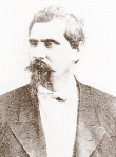 Ridge did not stand trial; he took off for California and the Gold Rush. As he headed west, Ridge supported himself by writing poems and stories for newspapers. In 1848, he wrote a piece for the Texas Northern Standard advocating Cherokee admission as a state. Ridge wrote about the Gold Rush and Indian affairs for newspapers in Texas, Louisiana and California.
Ridge did not stand trial; he took off for California and the Gold Rush. As he headed west, Ridge supported himself by writing poems and stories for newspapers. In 1848, he wrote a piece for the Texas Northern Standard advocating Cherokee admission as a state. Ridge wrote about the Gold Rush and Indian affairs for newspapers in Texas, Louisiana and California.
"I suppose you know pretty well from different sources what my history has been in California. It has been a series of bad luck," Ridge wrote his cousin Stand Watie in 1853. "I have tried the mines, I have tried trading, I have tried everything but with no avail, always making a living but nothing more. If I could have contented myself to remain permanently in the country, I could have succeeded in making a fortune, but I have been struggling all the time to make one in a hurry so that I might return to Arkansas (and I say to you) to the Cherokee Nation also."
Ridge also continued to write. He was a frequent contributor to the literary magazine, The Golden Era,where he shared bylines with the likes of Bret Harte, Mark Twain and Joaquin Miller. His pen-name was Yellow Bird, a translation of his Cherokee name, Chees-quat-a-law-ny. The author Yellow Bird also completed a novel, The Life and Adventures of Joaquin Murieta, a story about a Mexican bandit. This may have been the first novel by an American Indian author, and, ironically, it created an enduring stereotype and myth about people from another culture.
"I expected to have made a great deal of money off of my book," Ridge wrote Watie in October of 1854. "And my publishers, after selling 7,000 copies and putting the money in their pockets, fled, busted up, tee totally smashed, and left me, with a hundred others, to whistle for our money!"
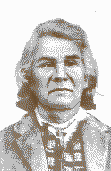 In the same letter, Ridge outlined for Watie a "most powerful friend," a proposal for an Indian newspaper to be located somewhere near the Cherokee Nation. "It would be a medium not only of defending Indian rights and making oppressors tremble, but of preserving the memories of the distinguished men of the race, illustrating their characters and keeping green and fresh many of the most important events of Indian history which should not be allowed to perish.
In the same letter, Ridge outlined for Watie a "most powerful friend," a proposal for an Indian newspaper to be located somewhere near the Cherokee Nation. "It would be a medium not only of defending Indian rights and making oppressors tremble, but of preserving the memories of the distinguished men of the race, illustrating their characters and keeping green and fresh many of the most important events of Indian history which should not be allowed to perish.
"Now Stand, if you will furnish the money to buy a press, I will engage to edit it ... I want to preserve the dignity of the family name ... Don't you see how much precious time I am wasting in California? I should be using my pen in behalf of my own people."
Ridge and Charles Watie were hired in 1856 as editors of The California American. Meanwhile, Charles Watie continued to press his brother Stand for money to start a Cherokee newspaper-and hinted that Ridge might not be immediately available. Perhaps Ridge changed his mind because he was keen on his new career. The American was a political journal, and Ridge could use his pen to promote his ideas about liberty, democracy and the future of Indian country.
After a year as editor-essentially a hired gun-Ridge organized a group of Sacramento business leaders to start a new paper. They purchased the plant of The California American and announced the creation of The Sacramento Daily Bee. The first issue was published on Feb. 3, 1857, and Ridge wrote: "The name of The Bee has been adopted, as being different from that of every other paper of the state, and as also being emblematic of the industry which is to prevail in its every department."
Ridge, the poet and novelist, said he had found his true calling. He divided newspaper editors into "true editors" and "apologies for editors." True editors, he said, must know "everything" and must carry a vast "fund of general information, for there is not a subject which engages men's minds, in whatever range of science or literature, upon which he is not peremptorily called to write."
The Bee's editor also called for a new kind of journalism. He attacked the fiercely partisan newspapers as "nothing more than the sneaking apologists of scoundrels who pay them for the trouble of lying." Ridge defended the entry of women into journalism.
And he made it clear that The Bee's editorials carried the soul of an American Indian. In an essay about poetry, for example, Ridge writes: "The speech of the North American warrior or chief in council is full of metaphor and the essence of poetry. It is up to the true poet to use his pen, his chisel, or his pencil ... to give us pictures of our nobler selves."
In July of 1857, the Sacramento partners who owned The Bee sold it to James McClatchy. (Ridge was headed to another California newspaper as editor.) The official history of The Bee begins here-and it is somewhat different from the history just cited. This sentence is from a book called Newspapering in the Old West by Robert Karolevitz: "The Sacramento Daily & Weekly Bee was founded on Feb. 3, 1857, and under the editorship of James McClatchy, The Bee was anything but a drone."
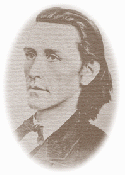 Or, The Bee's official history said it this way: "When the Sacramento Daily Bee was founded, Ridge was associated with the paper for a period of two months."
Or, The Bee's official history said it this way: "When the Sacramento Daily Bee was founded, Ridge was associated with the paper for a period of two months."
According to The Bee, it was only after Ridge left Sacramento that he could claim the title of owner or editor. Ridge went on to edit and own several newspapers in California, and all carried the unmistakable mark of a political journalist who cared about his country and its policy toward the Native Americans.
John Rollin Ridge was not the only cousin writing about Cherokee politics in mainstream newspapers. Colonel Elias Cornelius Boudinot, the son of Elias Boudinot, edited The Arkansian in Fayetteville, a town bordering the Cherokee Nation. The colonel had no military experience and was only 24 years old.
"Lay aside fears that your editor will get rich faster than his neighbors," Boudinot wrote on March 5, 1859. "We never heard of a man making more than a decent living by the publishing of a county newspaper."
Boudinot encouraged subscriptions from people who agreed with his thinking. And, "do not expect the editor to make honest mention of you and your business every few weeks for nothing."
Even though The Arkansian was a mainstream newspaper, Boudinot took advantage of every opportunity to ridicule his father's political opponent, Chief John Ross. "Our war upon this chief, whose long cause of thirty years has been sustained with blood and corruption, shall be a war to the knife," Boudinot wrote.
However, Boudinot was fair. He also printed letters from a challenger, "Sofkey."
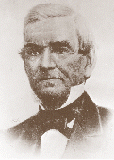 "Mr. Ross has at last found a champion in Sofkey," Boudinot wrote.
"A friend informs us that Sofkey is a word for mangy dog."
"Mr. Ross has at last found a champion in Sofkey," Boudinot wrote.
"A friend informs us that Sofkey is a word for mangy dog."
("Sofkey" is a Creek word for corn and can be used to describe a sour mash after the corn softens-sometimes dogs get into this mess and gain a unique look.)
But Sofkey was a worthy opponent. He wrote: "As we are not competent to answer you with words and acknowledge that you are our superior-and if we were capable of answering you with a pen, we would not waste our time and words with no such d----d scoundrel as you are. Sofkey."
Most of Boudinot's passion was saved for the issue of the day, the growing threat of civil war. The colonel saw the South as the only hope for the Cherokee Nation. "And all abettors of Abolition from the Chief down should be publicly warned that although the South is the natural protector of the Cherokee, Creeks, and Choctaws, yet the South will sweep from its frontier every one who is so basebold, or insidious, as to raise thereon the Black Flag of Abolition."
Boudinot, his family, Chief Ross, indeed many wealthy Cherokees were slave holders in Georgia and, after removal, in Oklahoma. On this issue Boudinot saw no middle ground.
"The distinctions are hypocritical. ... We believe in aggressive slavery; that it is the duty of all good meaning citizens, if they are able, to own Negroes. We believe the Creator will inflict a terrible punishment on those who neglect this duty."
As his father had, Boudinot found that the constitutional guarantees of liberty were not always the same for Americans who were not white. One newspaper questioned his right as an American Indian even to vote. The State Rights Democrat claimed Boudinot left the Cherokee Nation for Arkansas "either for the country's good or to save his own scalp." The paper claimed the editor was "impudently interfering" in public affairs, adding that "free white citizens" were more qualified to "manage their own affairs without being dictated to by this unnaturalized Indian refugee."
Nonetheless, most in the states'-rights cause considered Boudinot a patriot-and he was rewarded by being named co-editor of the True Democrat in the capital city of Little Rock and later appointed chairman of the state Democratic Party. He continued his anti-Union rhetoric and was named secretary to the state's secession convention. During the war, after winning a commission as a lieutenant colonel, Boudinot was a delegate to the Confederate Congress in Richmond. He returned to newspaper writing and editing after the war.
Ridge and Boudinot both excelled at the political journalism of the mid-19th century. They edited newspapers during elections-when the party (most often the Democratic Party) needed their passionate sermons. Both editors also made Indian affairs somewhat mainstream in their newspapers' coverage-although Ridge looked down on tribes less civilized than the Cherokee.
...Pictures of our nobler selves
The first editor of an Indian daily, a newspaper called The Indian Journal, was a Creek poet and journalist by the name of Alexander Posey. He wrote this poem, "Ode to Sequoyah," around the turn of the century to honor the inventor of the Cherokee alphabet.
The names of Watie and Boudinot -
The valiant warrior and gifted sage -
And other Cherokees may be forgot,
but thy name shall descend to every age ...
The world did remember Sequoyah. And it did forget the sage Boudinot, his relatives Stand Watie, John Rollin Ridge and Colonel Elias C. Boudinot, Ora Eddleman Reed, Tanna Beebe and many, many others who made important contributions to the journalism profession. There was Edward Bushyhead, a Cherokee, and founder of the San Diego Union; Peter Navarre, a Prairie Band of Potawatomie member, and owner of the Rossville Reporter in Kansas; William G. Pugh, a Lakota and owner of The Martin Messenger, and Leon Boutwell, Ojibway, a former professional football player and owner of the Mechanicsburgh, Ohio, Daily Telegram. There was Zitkala Sa or Gertrude Bonnin, a Sioux, who wrote for The Atlantic Monthly and other magazines, who wrote books and who even composed a full-scale opera.
John Rollin Ridge was talking about poets and journalists when he wrote that Native Americans can use a pen, chisel or pencil "to give us pictures of our nobler selves." But Ridge might as well have been talking about the America that could be, the America that would be the very essence of democracy. This nobler America would embrace native journalists, past and present, and would include other forgotten elements of society. Ridge wanted more women to work at newspapers-and for all readers to understand what female journalists had to say. He wrote a novel decrying the injustice suffered by Mexican-Americans who lived in California during an era of intense anti-immigration laws. Ridge saw oppression the same way, whether it was directed at Cherokee or Mexican miners.
Ridge also understood the inherent power of tribal newspapers. He wrote his mother that if he could start a newspaper in the Cherokee Nation, "I can bring into its column not only the fire of my own pen, such as it may be, but the contributions of leading minds in the different Indian nations. I can bring to its aid and support the Philanthropists of the world. I can so wield its power as to make it feared and respected. Men, governments will be afraid to trample upon the rights of the defenseless Indian tribes, when there is a power to hold up their deeds to the excration [sic] of mankind."
...
"The media has, for its own purposes, created a false image of the Native American. Too many of us have patterned ourselves after that image. It is time now that we project our own image and stop being what we never really were."
Mark N. Trahant
Copyright ©1995 The Freedom Forum First Amendment Center -- http://www.fac.org